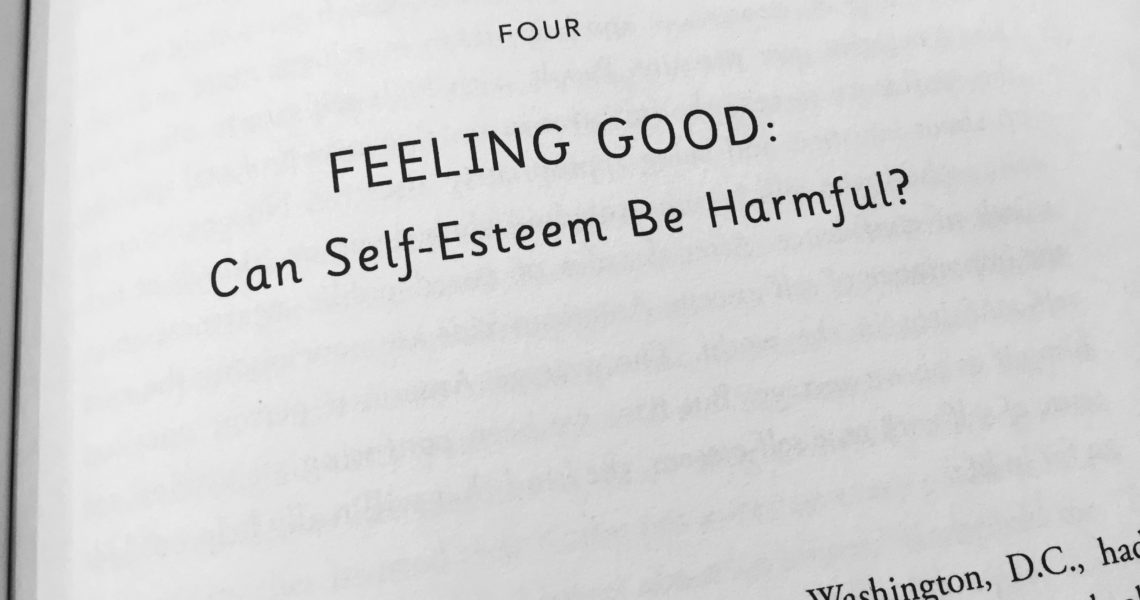Chapter Four :: Feeling Good – Can Self-Esteem Be Harmful?
So, as I was reading this book, I started to realize that I needed to write some of this info down because (personally) I could relate and also it was just so good. I could summarize this chapter in one phrase: Effort is a growth mindset.
I came away from this chapter with the thought to value effort over intelligence and self-worth. As an American, raised in a great home, and being the youngest, I was showered with praise and big dreams. This chapter spoke to me, because, as an adult, I find myself not quite living up to the expectations of my childhood. Anyway, that is a subject for another day.
Christine Gross-Lou, author of Parenting Without Border, compares the American culture of praise based parenting to other cultures that value effort. She wrote that 85 percent of American parents believed that “praising their children was necessary to make them feel smart.” However, this self-esteem first type of parenting can undermine the development of an important, life compelling trait: resilience.
Resilience (that ability to pick yourself up after failure and to grow from challenges and struggles rather than to give up and be defeated by them) is so critical that it’s now understood to be (along with self-control and motivation) as important as IQ in determining success. But it’s not something our kids are born with naturally; resilience is an “acquired trait” that parents cultivate in their kids. [p 90]
Lavishing our children with how great they are or how incredible they are doing can deter them from accepting the challenges that build internal resilience.
An overinflated sense of self isn’t what leads to happier, more competent, more confident children. Instead, it deprives children of the chance to build up the genuine reserves of self-confidence they’d get through mastering difficult tasks on their own. Not only do kids become afraid of failure; they might even feel worse about themselves: kids who are praised for being “smart” feel less intelligent when they make mistakes. When their self-worth and very identity depends on being smart, they are at risk of being less able to persevere through challenges. [p 90.91]
Other cultures prioritize values and morals over self-esteem. It could be said that those with lower self-esteem actually “may do better, because they often try harder.” [p 93]
“Forget about self-esteem and concentrate more on self-control and self-discipline. Recent work suggests this would be good for the individual and good for society.” Psychologist Roy Baumeister, once a forceful and outspoken champion of fostering children’s self-esteem. [p 93.94]
In Japan, modesty is a virtue: “It takes commitment to achieve a level of mastery that is praiseworthy.” [p 95]
It turns out that when parents and educators send children the message that their needs and their individual happiness and dreams are more important than other things, like being a compassionate, ethical, hard-working person, it makes them unhappy. People who have been told to put themselves and their needs first feel empty and discontented, and dissatisfied with themselves because they feel they deserve to be special rather than accepting and understanding of ways that our ordinariness connects us to other human beings. [p 99]
Other cultures tend to place importance on attending to the areas you need to improve over praising you for the areas you may have been successful. It takes confidence to face your short comings. In Japan, children and adults alike take part in the practice of self-reflection which they call hansei. “Students reflect frequently” – after a big event or even after ordinary moments. The purpose to always be improving. At such a reflection time, students will stand before up to 150 parents and talk about their failures from the previous year and their goals for the coming session and how they can improve to reach these new goals. Many student handouts will contain an area that says: “What I can do better next time; what I’ll try to work harder on next time.” The effort is to allow children to form the habit of always being attentive to how they can improve.
Japanese schools do not label children. There are no gifted or special or disabled classifications. Everyone is given the same level of education and expected to learn. Struggling kids will do work in front of the class and the class will help them through it. Young children (as young as 3) are expected to memorize long lyrics and songs and sing with accurate pitch in school performances.
Lastly, the author compares two mindsets: fixed and growth. A fixed mindset is a fixed idea of the traits one has, for example intelligence. It is a mindset that is “stable and unchangeable”. A growth mindset, or an effort-first mindset, “motivates you to face challenges.”
A child who has growth mindset may have been praised and encouraged as well, but more for the qualities that are within her control – qualities of growth – such as the ability to work hard, to try hard, to practice, and to face setbacks and to give things another try. [p 111]
It is the difference of “you must be very smart at this” (fixed) versus “you must have worked very hard” (growth).
The author ends with an understanding for balance between both cultures. Both can be negative if done to an extreme. The difficulty is in finding that balance. In summary, if we place value on effort (praising for hard work) and teach our children to always be attentive to how they can improve, self-esteem and confidence will naturally result as they achieve, succeed, and overcome. This one line seems to sum up the chapter’s intent: “You can grow your intelligence.”
